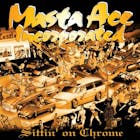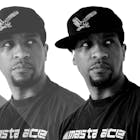
Classic Albums: 'Disposable Arts' by Masta Ace
Classic Albums: 'Disposable Arts' by Masta Ace
Published Sun, October 17, 2021 at 5:00 PM EDT
Masta Ace had had enough.
His group, Masta Ace Inc. had dissolved acrimoniously, and Ace would spend the latter part of the 1990s working on an album that the label ultimately shelved. It felt like the unceremonious end to a career that had already undergone it's fair share of twists and turns.
He'd enrolled at the University of Rhode Island before a friend enrolled the teenage Duval Clear into a rap contest in Queens. He won and the prize was recording time with hot Hip-Hop producer Marley Marl. Ace became part of Marley's core and eventually joined the legendary Juice Crew, a collective of emcees affiliated with Marley and Cold Chillin' Records. Amongst the crew, Ace had to elbow his way in, with stars like Big Daddy Kane, Biz Markie and Kool G Rap already in the fold. His noteworthy verse on Marley Marl's classic posse cut "The Symphony," as well as his debut album, 1990s Take a Look Around, announced him as the newest talent on Cold Chillin' Records; but he would depart that label after only one album.
Ace landed on Delicious Vinyl, formed Masta Ace, Inc. (with Leschea, Paula Perry, Lord Digga and Eyceurokk) and dropped 1993s acclaimed SlaughtaHouse and 1995s Sittin' On Chrome. THe latter album broke Ace through to mainstream audiences, but left a bitter taste for the rapper as the final product was the result of label machinations. The West Coast-based Delicious Vinyl urged Ace to go in a G-Funk direction for ...Chrome; so he fought to return to his hardcore Brooklyn rap roots. Creative differences led to his departure from Delicious Vinyl, and for the next several years, Ace's career seemed to be in limbo.
“From 1996 to 2000, I didn’t release any music at all. I was at a crossroads,” Ace recalled to URI Magazine in 2018. “I thought my usefulness in the game had run out. I thought I’d become an executive producer.”
He recorded material that was never heard, as labels wanted Ace to follow the slick, Bad Boy-esque trends of the late 1990s, to which Ace resisted. He would make sporadic vinyl releases, while ghostwriting (including some high profile work for Will Smith) and mulling what would happen next.
Further agitating things was a perceived diss from Rawkus Records act The High & Mighty; and a beef with rapper Boogieman, who'd released a song called "Ghetto Love" that was similar to Ace's "Ghetto Like." Ace addressed adversaries on the underground single "Acknowledge," dissing The High & Mighty and Boogieman. The feud with Boogieman led to a poor showing at Lyricist's Lounge. Battle rap aficionados know the story: Masta Ace showed up unprepared and got shown up by Boogieman, in a performance so bad the former Juice Crewer seemed to almost immediately go on the defensive.
With doubters at an all-time high and with nothing to lose, Ace set to work on the project he almost hoped would be his last album. He was beyond disillusioned; the rap game had left a bitter taste in the veteran emcee's mouth and he had good reason to say the hell with all of it.
"I had an idea of what I wanted the album to be and sound like and what the blueprint was gonna be. The storyline, the skits--I had all of that in my head. I just wanted it to come out like what I would consider the perfect album if it's going to be my last one. I really went into it with that point of view and i didn't accept input from outside people. My two partners would make suggestions and I'd just ignore them."
Armed with producers of his choice, and working with artists he respected, this project was born of Masta Ace's creative vision. He grabbed underground emcees like Punch and Wordsworth; a then-unknown Jean Grae and red-hot Rah Digga.
"I gave [Jean] a beat for her album and that's kind of how the relationship got started," Ace shares, recounting how he met Jean after seeing her perform with an early group. "She stood out among all of them, with her personality and [the] deliver of her lyrics." When it was time to work together, Ace produced a track for Jean's debut and he asked her to return the favor via a verse."

"I knew she could pull off what I needed to be done. And she, of course, did her thing on it."
- Masta Ace
DROP YOUR EMAIL
TO STAY IN THE KNOW
And Rah Digga guests alongside Leschea on "The Type I Hate," another album standout.
"Rah Digga has always been fam," Ace explains. "I've been tight with Busta and his camp since the mid-90s or so. She was always around and the particular song i wanted, I felt like she was the perfect female voice to the concept. And I know she's an ill writer." Digga had just released her debut album Dirty Harriet, the year before, and with Busta Rhymes topping the charts, Digga and Flipmode Squad were riding high.
"I knew she could pull off what I needed to be done," says Ace. "And she, of course, did her thing on it."
His time at URI informed the album's narrative. Ace felt like an outsider when he was a student, and, even years later, that experience permeates the album. On Disposable Arts, Paul Barman is a stand-in for Ace's college memories.
"Going to URI was a major culture shock for me, coming from Brooklyn," Ace told RapReviews in 2004. "For the first time in my life, I was living on my own and in a different state. It took some getting used to. Only one percent of the student population was African-American my freshman year. I felt a bit out of place and students were constantly assuming that I was there to play basketball or football, since most of that one percent were athletes. I was one of only a handful of [African-American] students there that was not on a sports team."
"When I did SlaughtaHouse, I kinda had creative freedom tot make that record," he says. "But the A&R would fly out from L.A. to the studio and kinda listen in--'Lemme see what your'e working on.' And he would report back to his bosses what he was hearing. And there was a little sense of worry there like 'man, what's he going to back and tell 'em?' He' sjust listening and flying back to L.A. with the info.
"But Disposable Arts was the first time I didn't have to deal with any of that."
When asked what Disposable Arts means to him two decades later, Ace still holds the project in the highest esteem.
"What that album did for me? It gave me a 20 year extension on my career," Ace says. "I'll always be the most attached to that album because of what it did for me. I went into that album thinking it was definitely going to be my last album."
"That album means I got an extra 20-plus years on a career that was on fumes when it dropped."






